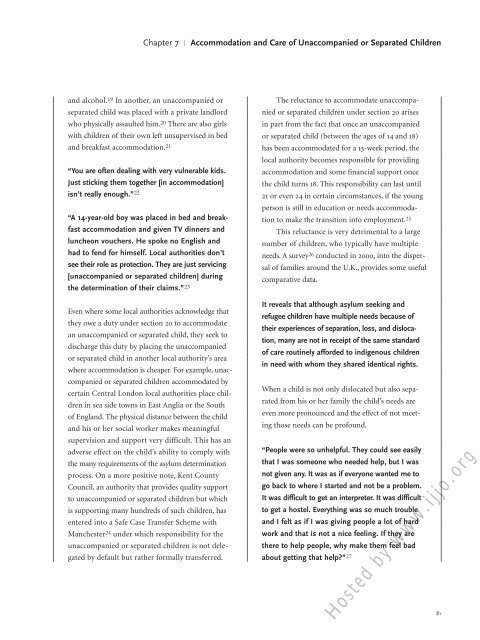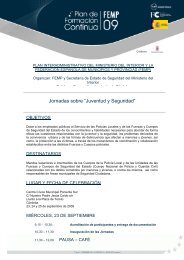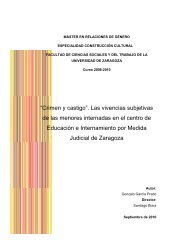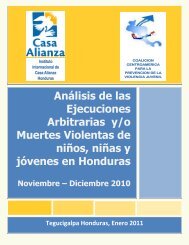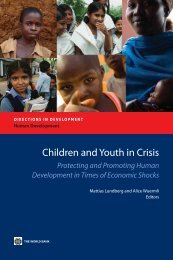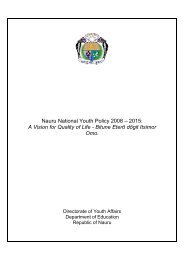Hosted by www.ijjo.org
Hosted by www.ijjo.org
Hosted by www.ijjo.org
Create successful ePaper yourself
Turn your PDF publications into a flip-book with our unique Google optimized e-Paper software.
Chapter 7 | Accommodation and Care of Unaccompanied or Separated Children<br />
and alcohol. 19 In another, an unaccompanied or<br />
separated child was placed with a private landlord<br />
who physically assaulted him. 20 There are also girls<br />
with children of their own left unsupervised in bed<br />
and breakfast accommodation. 21<br />
“You are often dealing with very vulnerable kids.<br />
Just sticking them together [in accommodation]<br />
isn’t really enough.” 22<br />
“A 14-year-old boy was placed in bed and breakfast<br />
accommodation and given TV dinners and<br />
luncheon vouchers. He spoke no English and<br />
had to fend for himself. Local authorities don’t<br />
see their role as protection. They are just servicing<br />
[unaccompanied or separated children] during<br />
the determination of their claims.” 23<br />
The reluctance to accommodate unaccompanied<br />
or separated children under section 20 arises<br />
in part from the fact that once an unaccompanied<br />
or separated child (between the ages of 14 and 18)<br />
has been accommodated for a 13-week period, the<br />
local authority becomes responsible for providing<br />
accommodation and some financial support once<br />
the child turns 18. This responsibility can last until<br />
21 or even 24 in certain circumstances, if the young<br />
person is still in education or needs accommodation<br />
to make the transition into employment. 25<br />
This reluctance is very detrimental to a large<br />
number of children, who typically have multiple<br />
needs. A survey 26 conducted in 2000, into the dispersal<br />
of families around the U.K., provides some useful<br />
comparative data.<br />
Even where some local authorities acknowledge that<br />
they owe a duty under section 20 to accommodate<br />
an unaccompanied or separated child, they seek to<br />
discharge this duty <strong>by</strong> placing the unaccompanied<br />
or separated child in another local authority’s area<br />
where accommodation is cheaper. For example, unaccompanied<br />
or separated children accommodated <strong>by</strong><br />
certain Central London local authorities place children<br />
in sea side towns in East Anglia or the South<br />
of England. The physical distance between the child<br />
and his or her social worker makes meaningful<br />
supervision and support very difficult. This has an<br />
adverse effect on the child’s ability to comply with<br />
the many requirements of the asylum determination<br />
process. On a more positive note, Kent County<br />
Council, an authority that provides quality support<br />
to unaccompanied or separated children but which<br />
is supporting many hundreds of such children, has<br />
entered into a Safe Case Transfer Scheme with<br />
Manchester 24 under which responsibility for the<br />
unaccompanied or separated children is not delegated<br />
<strong>by</strong> default but rather formally transferred.<br />
It reveals that although asylum seeking and<br />
refugee children have multiple needs because of<br />
their experiences of separation, loss, and dislocation,<br />
many are not in receipt of the same standard<br />
of care routinely afforded to indigenous children<br />
in need with whom they shared identical rights.<br />
When a child is not only dislocated but also separated<br />
from his or her family the child’s needs are<br />
even more pronounced and the effect of not meeting<br />
those needs can be profound.<br />
“People were so unhelpful. They could see easily<br />
that I was someone who needed help, but I was<br />
not given any. It was as if everyone wanted me to<br />
go back to where I started and not be a problem.<br />
It was difficult to get an interpreter. It was difficult<br />
to get a hostel. Everything was so much trouble<br />
and I felt as if I was giving people a lot of hard<br />
work and that is not a nice feeling. If they are<br />
there to help people, why make them feel bad<br />
about getting that help?” 27 81<br />
<strong>Hosted</strong> <strong>by</strong> <strong>www</strong>.<strong>ijjo</strong>.<strong>org</strong>


